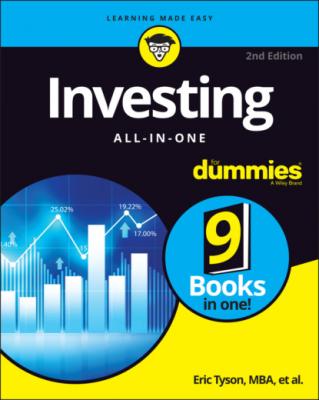Investing All-in-One For Dummies. Eric Tyson
Чтение книги онлайн.
Читать онлайн книгу Investing All-in-One For Dummies - Eric Tyson страница 44
 you should find out what their buying habits are, what products and services they favor, and so on. Understanding the basics of demographic shifts can give you some important insights that can help you make wiser long-term choices in your stock portfolio. With that particular headline, you know that companies that are well positioned to cater to that growing market’s wants and needs will do well — meaning a successful stock pick for you.
you should find out what their buying habits are, what products and services they favor, and so on. Understanding the basics of demographic shifts can give you some important insights that can help you make wiser long-term choices in your stock portfolio. With that particular headline, you know that companies that are well positioned to cater to that growing market’s wants and needs will do well — meaning a successful stock pick for you.
Keep your eyes open to emerging trends in society at large by reading and viewing the media that cover such matters (Time magazine, CNN, and so on). What trends are evident now? Can you anticipate the wants and needs of tomorrow’s society? Being alert, staying a step ahead of the public, and choosing stocks appropriately gives you a profitable edge over other investors. If you own stock in a solid company with growing sales and earnings, other investors eventually notice. As more investors buy up your company’s stock, you’re rewarded as the stock price increases.
Reading (And Understanding) Stock Tables
The stock tables in major business publications such as the Wall Street Journal and Investor’s Business Daily are loaded with information that can help you become a savvy investor — if you know how to interpret them. You need the information in the stock tables for more than selecting promising investment opportunities. You also need to consult the tables after you invest to monitor how your stocks are doing.
Looking at the stock tables without knowing what you’re looking for or why you’re looking is the equivalent of reading War and Peace backwards through a kaleidoscope — nothing makes sense. But this section can help you make sense of it all (well, at least the stock tables!). Table 1-1 shows a sample stock table. Each item gives you some clues about the current state of affairs for that particular company. The sections that follow describe each column to help you understand what you’re looking at.
TABLE 1-1 A Sample Stock Table
| 52-Wk High | 52-Wk Low | Name (Symbol) | Div | Vol | Yld | P/E | Day Last | Net Chg |
|---|---|---|---|---|---|---|---|---|
| 21.50 | 8.00 | SkyHighCorp (SHC) | 3,143 | 76 | 21.25 | +.25 | ||
| 47.00 | 31.75 | LowDownInc (LDI) | 2.35 | 2,735 | 5.9 | 18 | 41.00 | –.50 |
| 25.00 | 21.00 | ValueNowInc (VNI) | 1.00 | 1,894 | 4.5 | 12 | 22.00 | +.10 |
| 83.00 | 33.00 | DoinBadlyCorp (DBC) | 7,601 | 33.50 | –.75 |
52-week high
The column in Table 1-1 labeled “52-Wk High” gives you the highest price that particular stock has reached in the most recent 52-week period. Knowing this price lets you gauge where the stock is now versus where it has been recently. SkyHighCorp’s (SHC) stock has been as high as $21.50, whereas its last (most recent) price is $21.25, the number listed in the “Day Last” column. (Flip to the later section “Day last” for more on understanding this information.) SkyHighCorp’s stock is trading very high right now because it’s hovering right near its overall 52-week high figure.
Now, take a look at DoinBadlyCorp’s (DBC) stock price. It seems to have tumbled big time. Its stock price has had a high in the past 52 weeks of $83, but it’s currently trading at $33.50. Something just doesn’t seem right here. During the past 52 weeks, DBC’s stock price has fallen dramatically. If you’re thinking about investing in DBC, find out why the stock price has fallen. If the company is strong, it may be a good opportunity to buy stock at a lower price. If the company is having tough times, avoid it. In any case, research the firm and find out why its stock has declined. (Chapter 4 in Book 3 provides the basics of researching companies.)
52-week low
The column labeled “52-Wk Low” gives you the lowest price that particular stock reached in the most recent 52-week period. Again, this information is crucial to your ability to analyze stock over a period of time. Look at DBC in Table 1-1, and you can see that its current trading price of $33.50 in the “Day Last” column is close to its 52-week low of $33.
Name and symbol
The “Name (Symbol)” column is the simplest in Table 1-1. It tells you the company name (usually abbreviated) and the stock symbol assigned to the company.